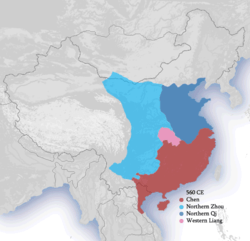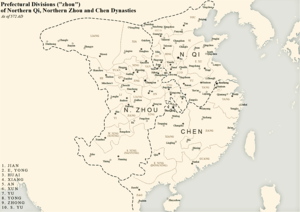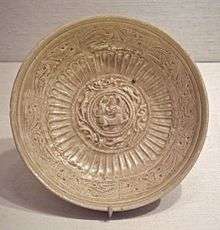Northern Zhou
| Northern Zhou 北周 | |||||||||||
|---|---|---|---|---|---|---|---|---|---|---|---|
| 557–581 | |||||||||||
 Northern Zhou territories in light blue | |||||||||||
 Administrative divisions as of 572 | |||||||||||
| Capital | Chang'an | ||||||||||
| Government | Monarchy | ||||||||||
| Emperor | |||||||||||
• 557 | Emperor Xiaomin of Northern Zhou | ||||||||||
• 557–560 | Emperor Ming of Northern Zhou | ||||||||||
• 560–578 | Emperor Wu of Northern Zhou | ||||||||||
• 578–579 | Emperor Xuan of Northern Zhou | ||||||||||
• 579–581 | Emperor Jing of Northern Zhou | ||||||||||
| History | |||||||||||
• Established | 15 February[1] 557 | ||||||||||
• Disestablished | 4 March[2] 581 | ||||||||||
| Area | |||||||||||
| 577[3] | 1,500,000 km2 (580,000 sq mi) | ||||||||||
| Currency |
Chinese coin, Chinese cash | ||||||||||
| |||||||||||

The Northern Zhou (/dʒoʊ/;[4] Chinese: 北周; pinyin: Bĕi Zhōu) followed the Western Wei, and ruled northern China from 557 to 581 AD. The last of the Northern Dynasties of China's Northern and Southern dynasties period, it was eventually overthrown by the Sui Dynasty. Like the preceding Western and Northern Wei dynasties, the Northern Zhou were members of the Tuoba clan of the Xianbei.
The Northern Zhou's basis of power was established by Yuwen Tai, who was paramount general of Western Wei, following the split of Northern Wei into Western Wei and Eastern Wei in 535. After Yuwen Tai's death in 556, Yuwen Tai's nephew Yuwen Hu forced Emperor Gong of Western Wei to yield the throne to Yuwen Tai's son Yuwen Jue (Emperor Xiaomin), establishing Northern Zhou. The reigns of the first three emperors (Yuwen Tai's sons) – Emperor Xiaomin, Emperor Ming, and Emperor Wu were dominated by Yuwen Hu, until Emperor Wu ambushed and killed Yuwen Hu in 572 and assumed power personally. With Emperor Wu as a capable ruler, Northern Zhou destroyed rival Northern Qi in 577, taking over Northern Qi's territory. However, Emperor Wu's death in 578 doomed the state, as his son Emperor Xuan was an arbitrary and violent ruler whose unorthodox behavior greatly weakened the state. After his death in 580, when he was already nominally retired (Taishang Huang), Xuan's father-in-law Yang Jian took power, and in 581 seized the throne from Emperor Xuan's son Emperor Jing, establishing Sui. The young Emperor Jing and the imperial Yuwen clan, were subsequently slaughtered by Yang Jian.[5][6]
The area was known as Guannei 關內. The Northern Zhou drew upon the Zhou dynasty for inspiration.[7] The Northern Zhou military included Han Chinese.[8]
Emperors
| Posthumous Names (Shi Hao 諡號) | Born Names | Period of Reigns | Era Names (Nian Hao 年號) and their according range of years |
|---|---|---|---|
| Northern dynasty | |||
| Northern Zhou Dynasty 557-581 | |||
| Convention: Northern Zhou + posthumous name | |||
| Xiao Min Di (孝閔帝 xiào mǐn dì) | Yuwen Jue (宇文覺 yǔ wén jué) | 557 | Did not exist |
| Ming Di (明帝 míng dì) or Xiao Ming Di (孝明帝 xiào míng dì) | Yuwen Yu (宇文毓 yǔ wén yù) | 557-560 | Wucheng (武成 wǔ chéng) 559-560 |
| Wu Di (武帝 wǔ dì) | Yuwen Yong (宇文邕 yǔ wén yōng) | 561-578 | Baoding (保定 bǎo dìng) 560-565 Tianhe (天和 tiān hé) 566-572 Jiande (建德 jiàn dé) 572-578 Xuanzheng (宣政 xuān zhèng) 578 |
| Xuan Di (宣帝 xuān dì) | Yuwen Yun (宇文贇 yǔ wén yūn) | 578-579 | Dacheng (大成 dà chéng) 579 |
| Jing Di (靜帝 jìng dì) | Yuwen Chan (宇文闡 yǔ wén chǎn) | 579-581[9] | Daxiang (大象 dà xiàng) 579-581 Dading (大定 dà dìng) 581 |
Emperors' family tree
| Northern Zhou emperors family tree | |||||||||||||||||||||||||||||||||||||||||||||||||||||||||||||||||||||||||||||||||||||||||||||||||||||||||||||||||||||||||||||||||||||||||||||||||||||||||||||||||||||||||||||||||||||||||||||||||||||||||||||||||||||||||||||||||||||||||||||||||||||||||||||||||||||||||||||||||||||||||||||||||||||||||||||||||||||||||||||||||||||||||||||||||||||||||||||||||||||||||||||||||||||||||||||||||||||||||||||||||||||||||||||||||||||||||||||||||||||||||||||||||||||||||||||||||||||||||||||||||||||||||||||||||||||||||||||||||||||||||||||||||||||||||||||||||||||||||||||||||||||||||||||||||||||||||||||||||||||||||||||||||||||||||||||||||||||||||||||||||||||||||||||||||||||||||||||||||||||||||||||||||||||||||||||||||||||||||||||||||||||||||||||||||||||||||||||||||||||||||||||||||||||||||||||||||||||||||||||||||||||||||
|---|---|---|---|---|---|---|---|---|---|---|---|---|---|---|---|---|---|---|---|---|---|---|---|---|---|---|---|---|---|---|---|---|---|---|---|---|---|---|---|---|---|---|---|---|---|---|---|---|---|---|---|---|---|---|---|---|---|---|---|---|---|---|---|---|---|---|---|---|---|---|---|---|---|---|---|---|---|---|---|---|---|---|---|---|---|---|---|---|---|---|---|---|---|---|---|---|---|---|---|---|---|---|---|---|---|---|---|---|---|---|---|---|---|---|---|---|---|---|---|---|---|---|---|---|---|---|---|---|---|---|---|---|---|---|---|---|---|---|---|---|---|---|---|---|---|---|---|---|---|---|---|---|---|---|---|---|---|---|---|---|---|---|---|---|---|---|---|---|---|---|---|---|---|---|---|---|---|---|---|---|---|---|---|---|---|---|---|---|---|---|---|---|---|---|---|---|---|---|---|---|---|---|---|---|---|---|---|---|---|---|---|---|---|---|---|---|---|---|---|---|---|---|---|---|---|---|---|---|---|---|---|---|---|---|---|---|---|---|---|---|---|---|---|---|---|---|---|---|---|---|---|---|---|---|---|---|---|---|---|---|---|---|---|---|---|---|---|---|---|---|---|---|---|---|---|---|---|---|---|---|---|---|---|---|---|---|---|---|---|---|---|---|---|---|---|---|---|---|---|---|---|---|---|---|---|---|---|---|---|---|---|---|---|---|---|---|---|---|---|---|---|---|---|---|---|---|---|---|---|---|---|---|---|---|---|---|---|---|---|---|---|---|---|---|---|---|---|---|---|---|---|---|---|---|---|---|---|---|---|---|---|---|---|---|---|---|---|---|---|---|---|---|---|---|---|---|---|---|---|---|---|---|---|---|---|---|---|---|---|---|---|---|---|---|---|---|---|---|---|---|---|---|---|---|---|---|---|---|---|---|---|---|---|---|---|---|---|---|---|---|---|---|---|---|---|---|---|---|---|---|---|---|---|---|---|---|---|---|---|---|---|---|---|---|---|---|---|---|---|---|---|---|---|---|---|---|---|---|---|---|---|---|---|---|---|---|---|---|---|---|---|---|---|---|---|---|---|---|---|---|---|---|---|---|---|---|---|---|---|---|---|---|---|---|---|---|---|---|---|---|---|---|---|---|---|---|---|---|---|---|---|---|---|---|---|---|---|---|---|---|---|---|---|---|---|---|---|---|---|---|---|---|---|---|---|---|---|---|---|---|---|---|---|---|---|---|---|---|---|---|---|---|---|---|---|---|---|---|---|---|---|---|---|---|---|---|---|---|---|---|---|---|---|---|---|---|---|---|---|---|---|---|---|---|---|---|---|---|---|---|---|---|---|---|---|---|---|---|---|---|---|---|---|---|---|---|---|---|---|---|---|---|---|---|---|---|---|---|---|---|---|---|---|---|---|---|---|---|---|---|---|---|---|---|---|---|---|---|---|---|---|---|---|---|---|---|---|---|---|---|---|---|---|---|---|---|---|---|---|---|---|---|---|---|---|---|---|---|---|---|---|---|---|---|---|---|---|---|---|---|---|---|---|---|---|---|---|---|---|---|---|---|---|---|---|---|---|---|---|---|---|---|---|---|---|---|---|---|---|---|---|---|---|---|---|---|---|---|---|---|---|---|---|---|---|---|---|---|---|---|---|---|---|---|---|---|---|---|---|---|---|---|---|---|---|---|---|---|---|---|---|---|---|---|---|---|---|---|---|---|---|---|---|---|---|---|---|---|---|---|---|---|---|---|---|---|---|---|---|---|---|---|---|---|---|---|---|---|---|---|---|---|---|---|---|---|---|---|---|---|---|---|---|---|---|---|---|---|---|
| |||||||||||||||||||||||||||||||||||||||||||||||||||||||||||||||||||||||||||||||||||||||||||||||||||||||||||||||||||||||||||||||||||||||||||||||||||||||||||||||||||||||||||||||||||||||||||||||||||||||||||||||||||||||||||||||||||||||||||||||||||||||||||||||||||||||||||||||||||||||||||||||||||||||||||||||||||||||||||||||||||||||||||||||||||||||||||||||||||||||||||||||||||||||||||||||||||||||||||||||||||||||||||||||||||||||||||||||||||||||||||||||||||||||||||||||||||||||||||||||||||||||||||||||||||||||||||||||||||||||||||||||||||||||||||||||||||||||||||||||||||||||||||||||||||||||||||||||||||||||||||||||||||||||||||||||||||||||||||||||||||||||||||||||||||||||||||||||||||||||||||||||||||||||||||||||||||||||||||||||||||||||||||||||||||||||||||||||||||||||||||||||||||||||||||||||||||||||||||||||||||||||||
See also
| Wikimedia Commons has media related to Northern Zhou. |
Notes
- ↑ Zizhi Tongjian, vol. 167.
- ↑ Zizhi Tongjian, vol. 175.
- ↑ Rein Taagepera "Size and Duration of Empires: Growth-Decline Curves, 600 B.C. to 600 A.D.", Social Science History Vol. 3, 115-138 (1979)
- ↑ "Zhou". Random House Webster's Unabridged Dictionary.
- ↑ Patricia Buckley Ebrey; Anne Walthall (1 January 2013). East Asia: A Cultural, Social, and Political History. Cengage Learning. pp. 76–. ISBN 1-133-60647-4.
- ↑ Patricia Buckley Ebrey; Anne Walthall (1 January 2013). Pre-Modern East Asia: A Cultural, Social, and Political History, Volume I: To 1800. Cengage Learning. pp. 76–. ISBN 1-133-60651-2.
- ↑ Charles Holcombe (2011). A History of East Asia: From the Origins of Civilization to the Twenty-First Century. Cambridge University Press. pp. 97–. ISBN 978-0-521-51595-5.
- ↑ ARS ORIENTALIS. 1986. p. 42.
- ↑ In 580, after Emperor Xuan's death, the general Yuchi Jiong, believing that the regent Yang Jian was about to seize the throne, rose against Yang and declared a son of Emperor Wu's brother Yuwen Zhao (宇文招) the Prince of Zhao, whose name is lost to history, emperor, but as Yuchi was soon defeated, and nothing further was known about the emperor that he declared, that son of Yuwen Zhao is usually not considered an emperor of Northern Zhou.